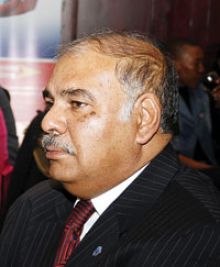Public Servants Demand Allowances, Pay Rise
Wanetsha Mosinyi
Correspondent
| Monday August 6, 2007 00:00


Ambulance drivers, for instance, recommended that they be paid a risk allowance because besides driving they assist in the lifting of patients, cleaning the ambulance and dealing with mentally disturbed patients, who are often violent.
The commissioners however suggested that instead of allowances it might be better government trains and introduces paramedics to handle such specialised jobs. One of the commissioners, Dr Joe Matome, advised that when public servants present their recommendations they should state the true picture about the complexity of their jobs rather than demand for allowances to compensate for the work not in their job descriptions.
Nurses argued that it is imperative that they be given a risk allowance because they are exposed to various risks when handling patients. Nurses said they are at risk from airborne infections and accidents especially when escorting emergency patients. 'Due to the call of duties we are also at risk of being raped and attacked by thugs while on night duty.'
Local police officers also argued in favour of the provision of risk allowance because the 'North East is near the border with Zimbabwe' where the current political instability in the neighbouring country affects them most. 'The Local Police also want a Frontier Allowance because of the issue of illegal immigrants who commit serious offences in the area and our goods are stolen while we are on duty,' articulated an unidentified Local Police Officer.
The Botswana Land Boards and Local Authorities Workers Union (BLLAWU) also supported the recommendation that the border frontier allowance be considered for officers working in border areas.
Officers from the North-East District Council treasury demanded that they be paid risk and security allowances, on the basis that they keep keys to offices and safes.
The commission however advised that civil service officers should give 'recommendations that are reasonable' so the government could consider them looking at the facts before them. One of the commissioners, Johnson Motshwarakgole, stated that if reasons, such as security at homes, are offered to justify their demands for an allowance it would not help their cause.
'I don't think if one is given so many allowances, then you are guaranteeing that they will be safe from criminal attacks. Yes, some of the conditions of service are not conducive but the demand for allowances to compensate them does not hold water,' advised Motshwarakgole.
Allowances recommended by the public servants range from Overtime (OT), speciality, professional duty, call, uniform, to night duty and subsistence allowances.
The issue of disparities among government departments was also highlighted during the oral presentations. BLLAWU stated that they are concerned about the disparities between them and their central government counterparts. 'We have been talking about these disparities for some years but there are still no improvements,' a worried Local Government officer lamented.
Local Police Officers questioned the reason for the disparities between them and their counterparts in the Botswana Police Service. Local police recommended that their salary scale should start at C4, not B3/2. 'Botswana police officers are enjoying the B1 scale whereas they have the same obligations as Local Police Officers. We further request the implementation of the Venson Commission clause, which stated that whatever applies to other disciplined forces shall apply to the Local Police Officers,' they recommended.
The public servants also recommended that progression to a higher post should not be limited to administrative duties. Nurses recommended that when one is venturing into administration duties, there should be an option for one to get involved in hands-on functions. This would mean that those at D2 scale, for instance, another level for administration, would perform other core functions of a nurse. ' This will lead to higher quality patient-care as opposed to the current arrangement where patient-care is relegated to junior and inexperienced staff.
Commission chairman Igbal Ibrahim said in an interview that he was pleased with the attendance rate and the good suggestions that the public has recommended so far. He, however, said some of the views might be replicated countrywide but he was happy with the progress. He stated that they have advised people (making submissions) to stick to the terms of reference, but 'if administration issues are raised and impact on government, then we shall pass them on to government'.
President Festus Mogae set up the Salaries Review Commission, which comprises government officials, the private sector and civil society members to review conditions of service including salary scales, allowances and fringe benefits for the public service as a whole.
